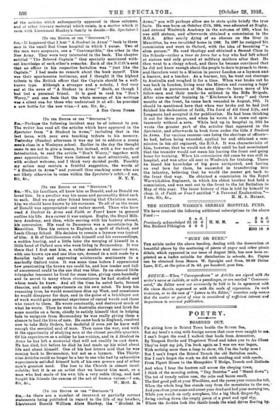[To 'FEZ EDITOR or TIM " SPECTATOR."]
Eta,—We, his familiars, all knew him as Donald, and as Donald we loved him. In a peculiar way his name and personality fitted each to each. Had we any other friend bearing that Christian name, him we should have known by his surname. To all of us the name of Donald was appropriated—and rather sacred. Those who have read A Student in Arms and Faith or Fear? know in general outline his life. As a career it was unique. Rugby, the Royal Mili- tary Academy, and then, while serving with his battery abroad, his conversion. His road to Damascus was a mountain-top In Mauritius. Then his return to England, a spell of Oxford, and Leeds Clergy School. His decision to remain a layman was typical of him. A fit of fastidiousness with himself and his surroundings, a sudden leaving, and a little later the merging of himself in a little band of Oxford men who were living in Bermondsey. It was there that I first met him, a rather sombre and reserved man, with one brown eye and one blue eye, dressed in a suit made by a Socialist tailor and expressing aristocratio sentiments in a markedly Oxford voice. It was some time before I appreciated how penetrating the brown eye could be, and how tender and full of amusement could be the one that was blue. In an absurd little triangular tenement he lived for some time, giving open-handedly and in secret to many whose circumstances he had studied and whose needs he knew. And all the time he noted facts, formed theories, and made experiments on his own mind. To keep his reasoning true, he would sometimes dine up West, and sometimes he would disappear for days, and in the guise of a bricklayer out of work would gain personal experience of casual wards and those who resort to them. He wrote constantly, and destroyed much of what he wrote. Then he went to Australia steerage and lived for some months on a farm, chiefly to satisfy himself that in helping lads to emigrate from Bermondsey he was really giving them a chance to lead the lives of men. He came back to England, resolved now to take Holy Orders, but doubtful if even yet he knew well enough the essential soul of man. Then came the war, and with it the opportunity of studying men at the closest possible quarters. Of his experiences as a soldier he has written, and in A Student in Arms he has left a memorial that will not readily be cast down. He has died, but before he died he had made up his mind about life and about himself. One of his last letters said that he was coming back to Bermondsey, but not as a layman. The Thirty- nine Articles could no longer be a bar to one who had by exhaustive experiments satisfied himself both of his own powers and of other men's greatest need. The loss to the Church is almost incal- culable; but it is as an artist that we lament him most, as a man who had made of his own life a very noble thing, and had taught his friends the canons of the art of human values.—I am,


































 Previous page
Previous page